#NEPETA!!!!!!!!!! rogue of heart………
Explore tagged Tumblr posts
Text
I haven't made a homestuck post in a bit so I just wanna talk about how much Nepeta as a character makes me a bit sad. All Rouges in Homestuck have problems with romance related to their aspect, with Roxy, as a Rouge of Void, fighting to feel relevant and seen through attempting to be seen as a "fun-loving, hot girl". As well as Rufioh, as a Rouge of Breath, struggling to stay bound in a romantic relationship, cheating on Damara with Horrus and wanting to leave Horrus by the time we're introduced to him. Heart players also struggle with Romance. This is shown with Meulin (who I have made a post about because I love Olive Bloods), who has had a failed relationship with Kurloz and a toxic moirailigence with Horuss. And Dirk, who fails to realize that he only loves his own idea of Jake until going into trickster mode. Nepeta as a Rouge of Heart is a heartbreaking mishmash of both of these traits. Not many people know, but Nepeta uses her shipping wall as a coping mechanism for her feelings of loneliness. Her unreciprocated flushed feelings for Karkat don't help her in the slightest. Although a lot of the ships she has come true, due to the fact that she's a Rouge, she can only give the romantic relationships she craves to others, guiding others to a treasure she cannot possess. Despite this, she's a very upbeat and pawsitive character (pun intended). She holds no negative feelings towards Terezi despite Karkat having a crush on her, in fact, she doesn't hold any negative feelings towards any of the Beta Trolls, including Eridan, who she actually feels sad for after discovering he died. Speaking of Eridan, I would like to point out that both Eridan and Nepeta have a LOT of things in common and unique interactions that not many people talk about. Firstly, both Nepeta and Eridan are the only two Beta Trolls who never got kissed. Along with this, while Eridan's arc revolved around switching sides and wanting to join Jack Noir, resulting in his death, Nepeta's arc revolves around her undying loyalty to her friends, which also results in her death. Also, Eridan is canonically the ONLY troll in Homestuck to have any romantic feelings for Nepeta. Along with this, Nepeta is the only character besides Feferi that Eridan asks to be matesprits with. Small tangent aside, Nepeta's lack of aggression towards the beta trolls is due to the fact that she has the only healthy moirailigence in the entirety of Homestuck. Although she often gets upset at Equius' behavior, she overall enjoys his presence and have a mutually beneficial relationship, with Nepeta calming down Equius' constant inner anger and strength complex and Equius letting Nepeta vent her frustrations to him about her deep feelings of loneliness. Her loyalty to her friends and complex inner turmoil as a Rouge of Heart leads her to have a deep wish to experience a love that will never flee from her. She ends up feeling as though she needs to be loved in order to be whole as a person and although the feelings towards Equius are strictly platonic, it's that loyalty and understanding that leads her to want to save him from Gamzee during Murderstuck.

In the end, Nepeta as a Rouge of Heart is a girl with a simple wish. To find love in order to not feel lonely and even though she doesn't succeed, she still fights to protect those she holds closely and while I believe her arc should've been written WAY BETTER AND KILLING HER OFF WAS SUCH BULLSHIT AND HUSSIE DIDN'T EVEN BRING HER BACK WHEN JOHN GOT THE ABILITY TO DO THAT AND IT MADE ME SO ANGRY!!! She's still one of the most enjoyable characters in all of Homestuck and my personal favorite Beta Troll. *Cough cough* anyway read S33K THE HIGHB100D by @pastabaguette it's beautiful. *Cough cough*
#homestuck#beta trolls#nepeta leijon#homestuck nepeta#nepeta my beloved#equius zahhak#rogue class#heart aspect#eridan ampora#s33k the highb100d#pastabaguette#gosh i love nepeta
71 notes
·
View notes
Text
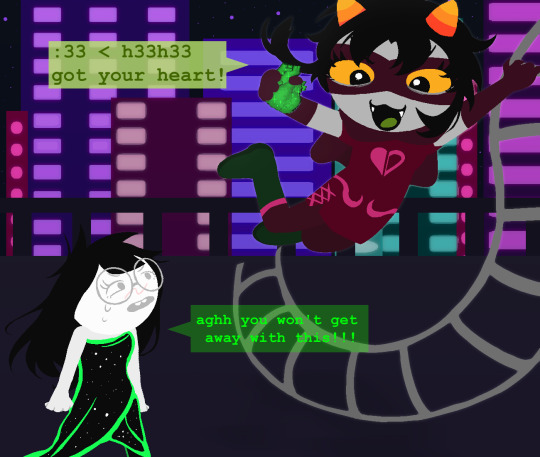
#dailyjadenep#jadenep#homestuck#jade harley#nepeta leijon#phantom thief nepeta :p#ms steal your heart!!#rogue of heart#the perspective is so odd...#oughhh old art charm
124 notes
·
View notes
Text
rogue of heartin'
#homestuck#nepeta leijon#i like the idea of rogues as like#heist prep class#very gimmicky and munchkiny just like a thief#but where a thief is kind of a fly by the seat of your pants type player#a rogue is more like a batman type#if you give them enough prep time theyre crazy strong#so 'stealing from heart' and heart = souls#i like the idea of nepeta being able to use the powers of people she's close to
155 notes
·
View notes
Text
why do rogues always have relationship issues. its downplayed with nepeta (though she's still hopelessly in love with someone she knows will never love her) but then we look at roxy and rufioh and. ouch
#homestuck#rogue class#rogue of heart#rogue of void#rogue of breath#nepeta leijon#roxy lalonde#rufioh nitram#nepkar#nepkat#rufuss#rufhor
24 notes
·
View notes
Text
Homestuck God Teir Trading Cards - public release batch 3: mid blood trolls
wing designs by @caligvlasaqvarivm
front - individual designs
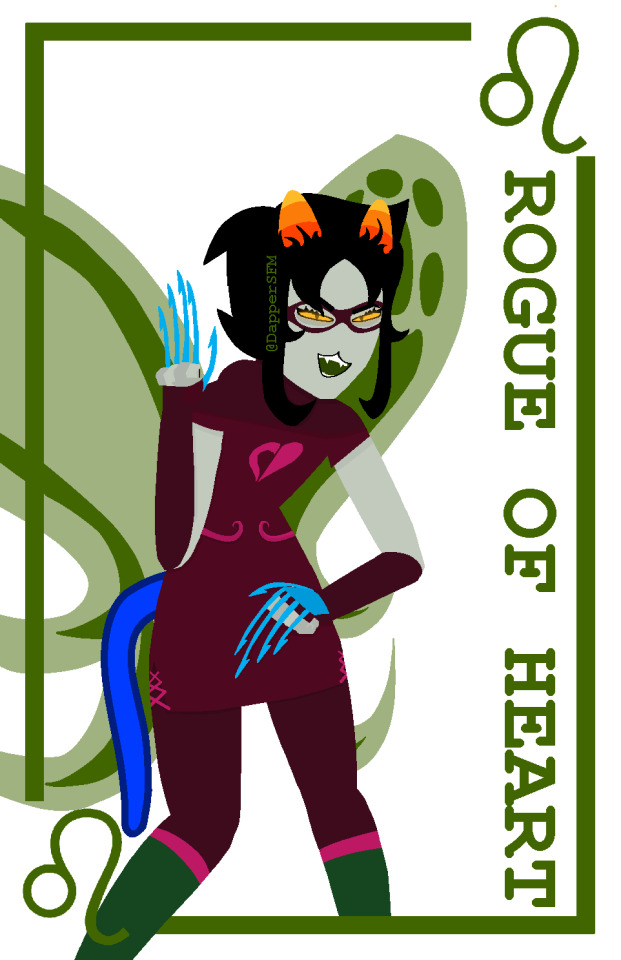
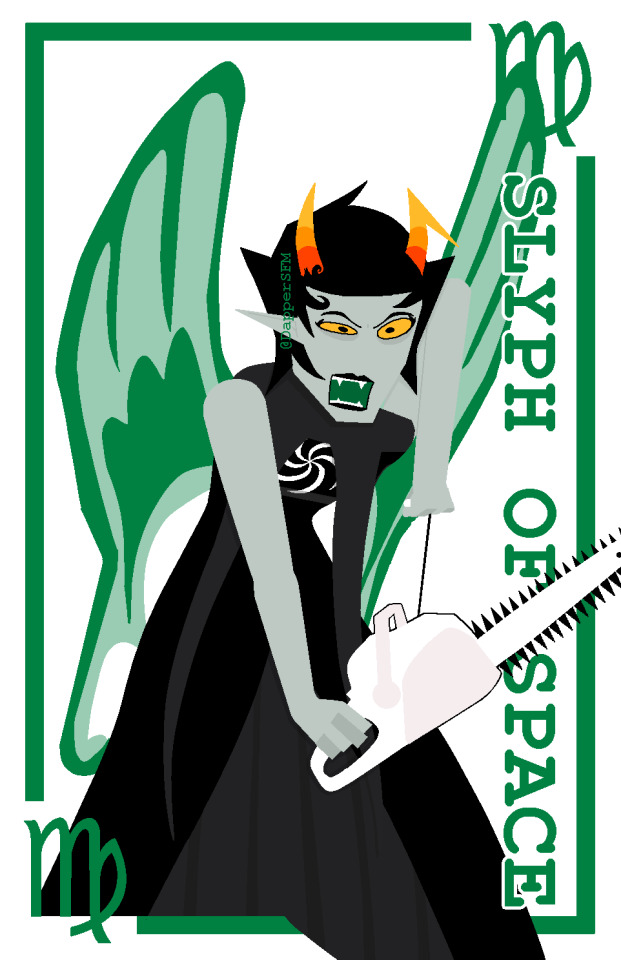
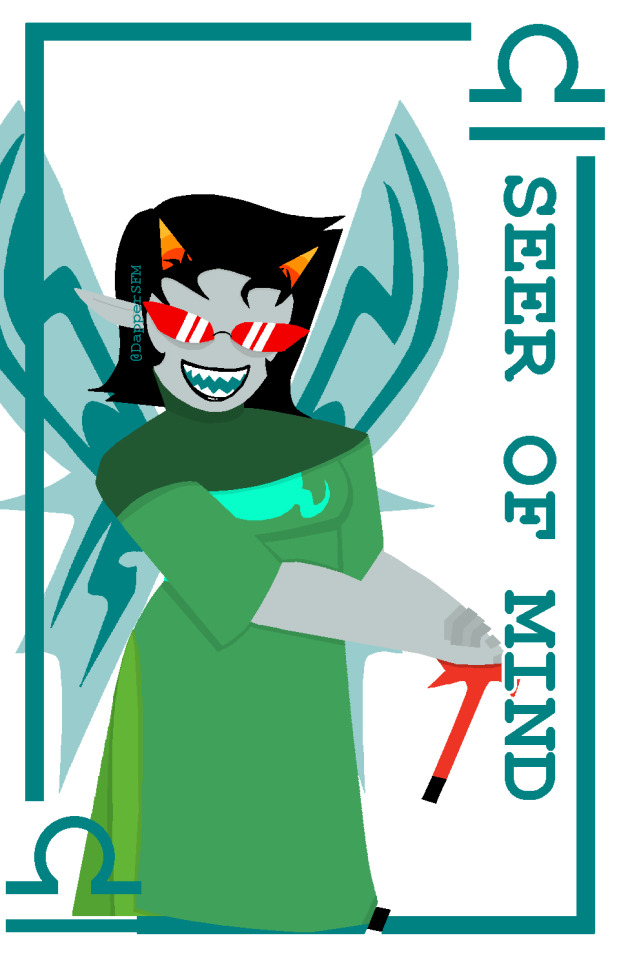
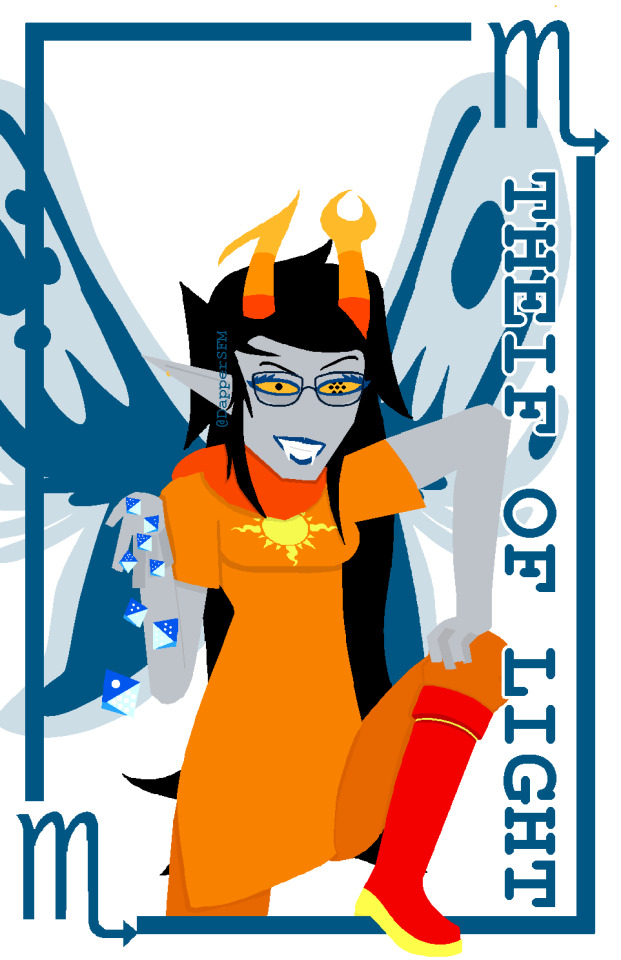
back - individual designs
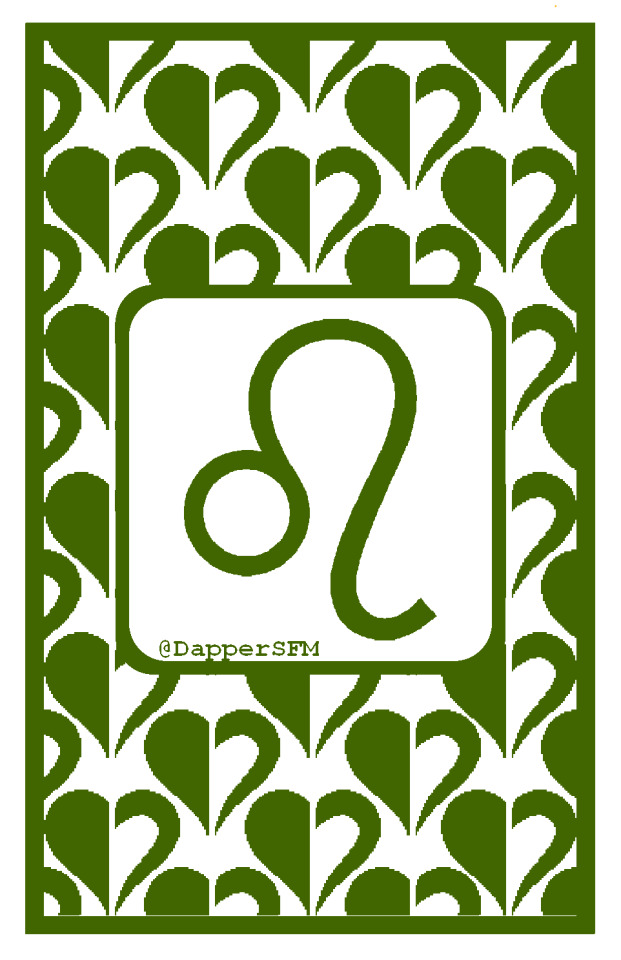
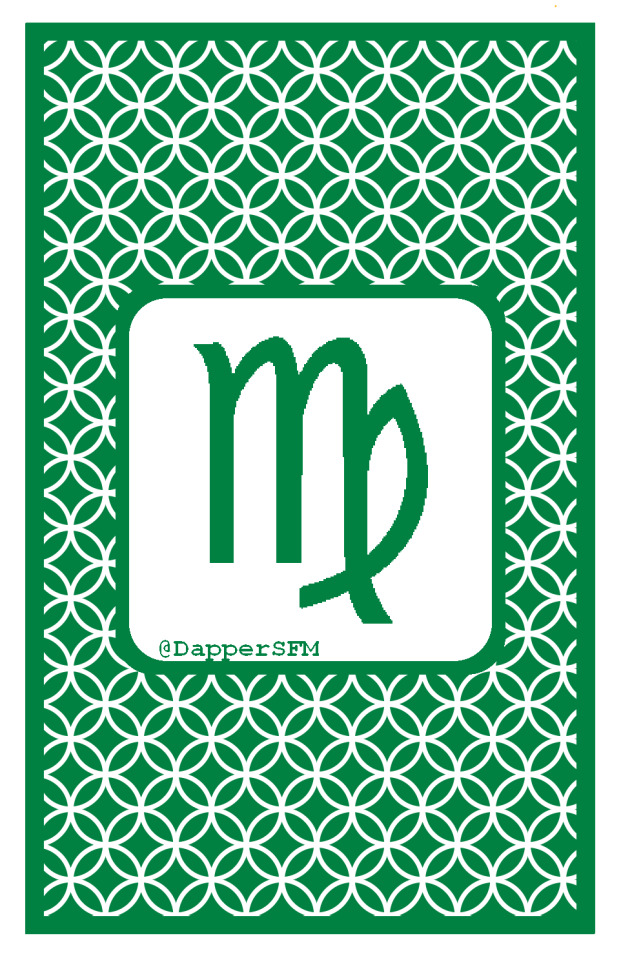
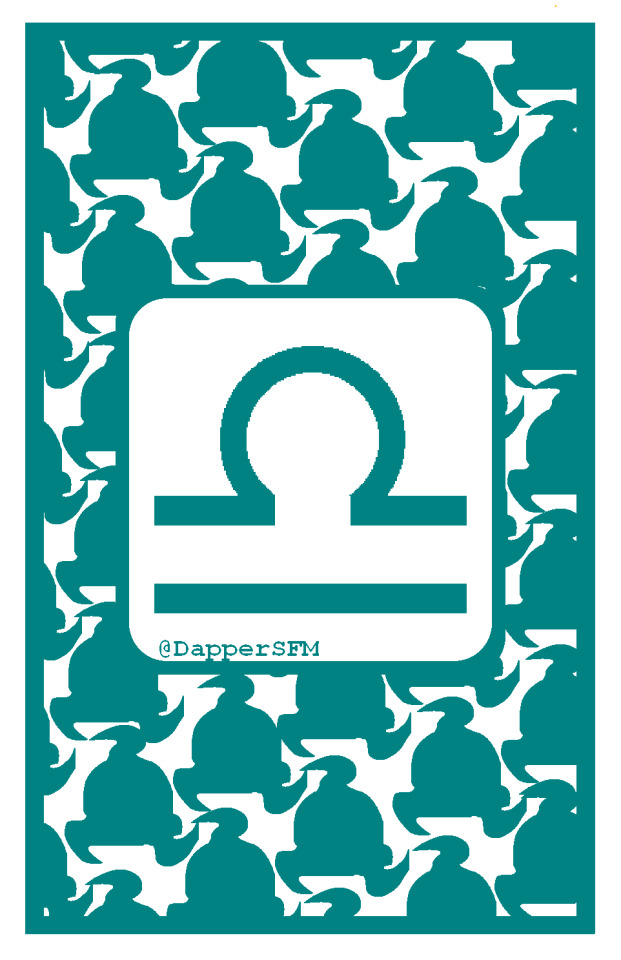
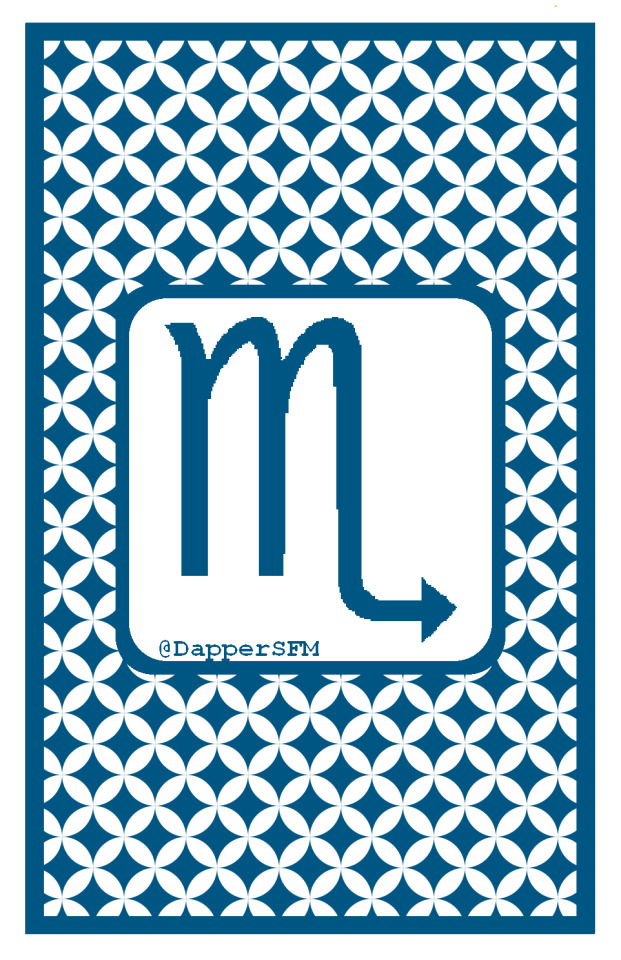
alt designs under the cut
front - catagory designs
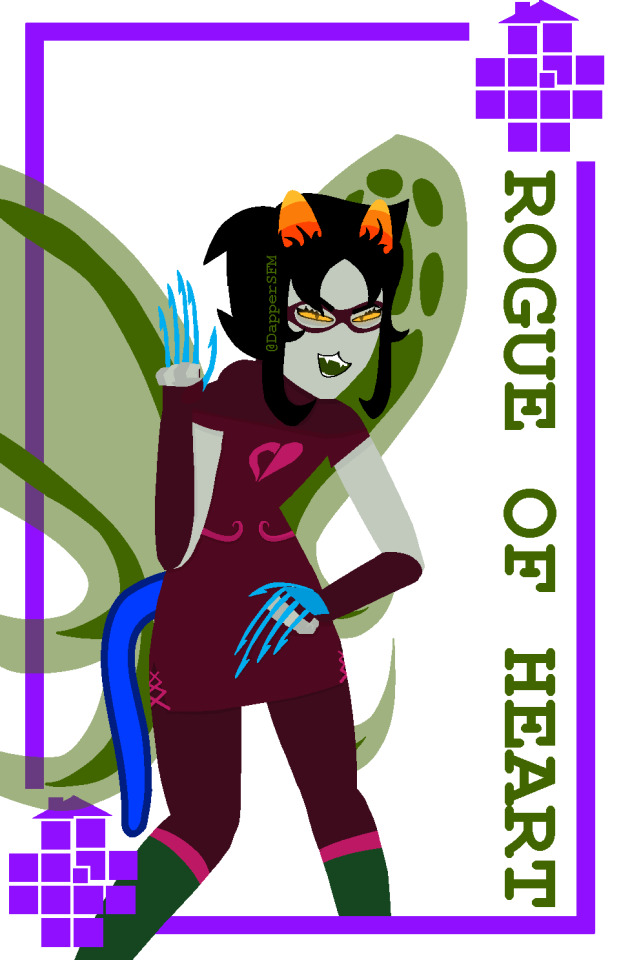
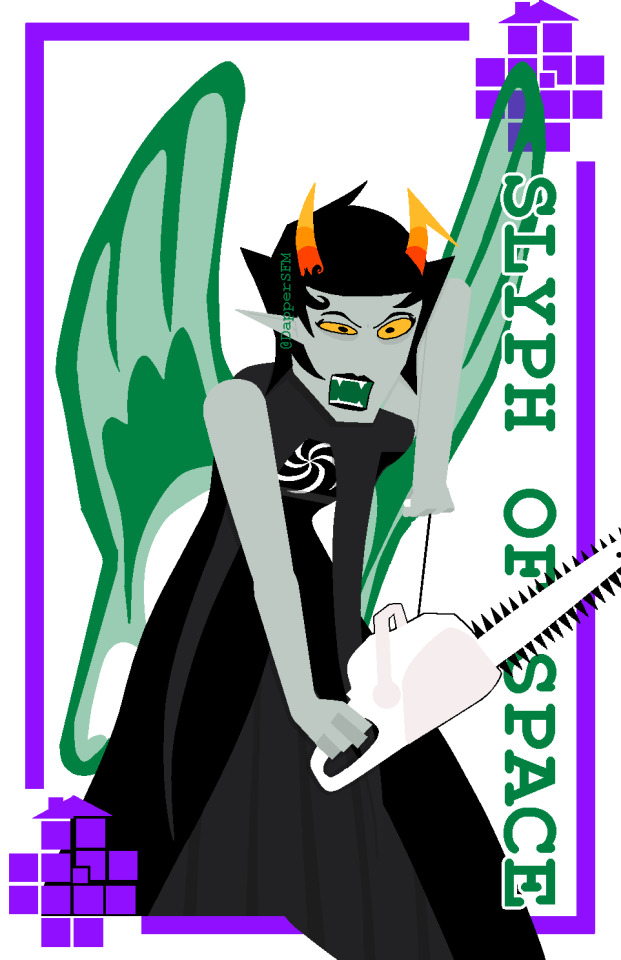
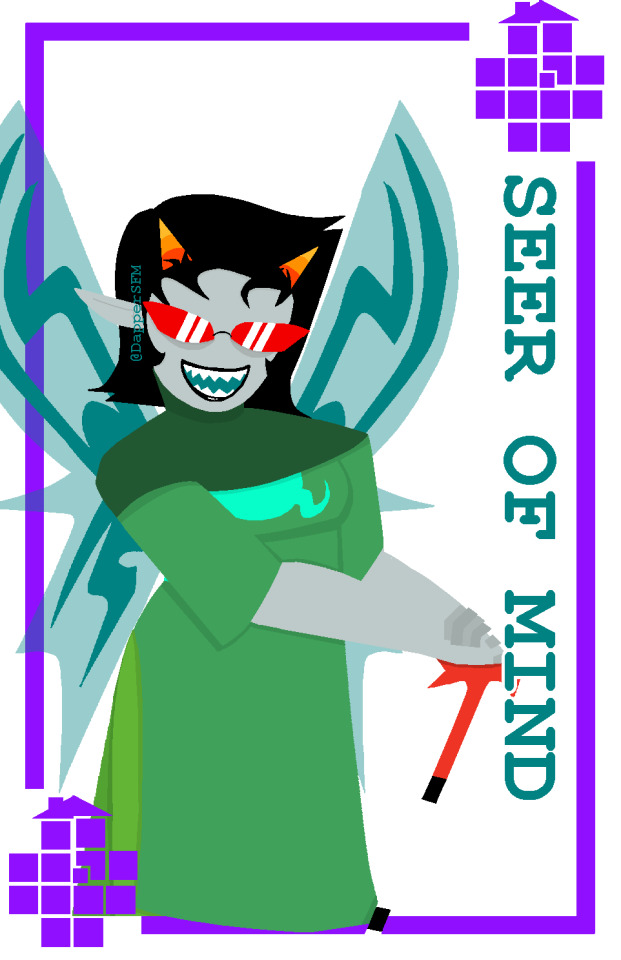
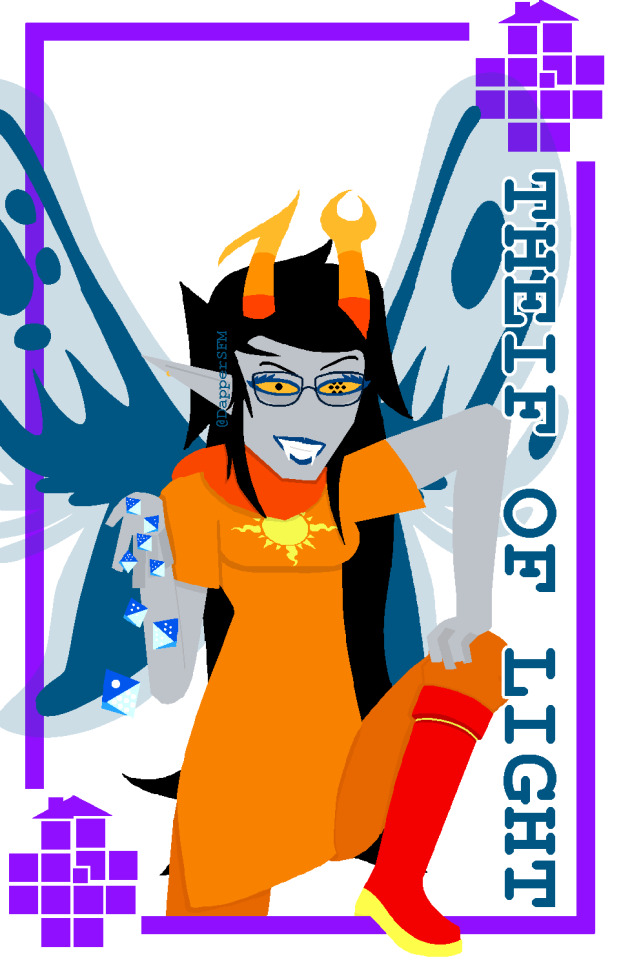
back - catagory design
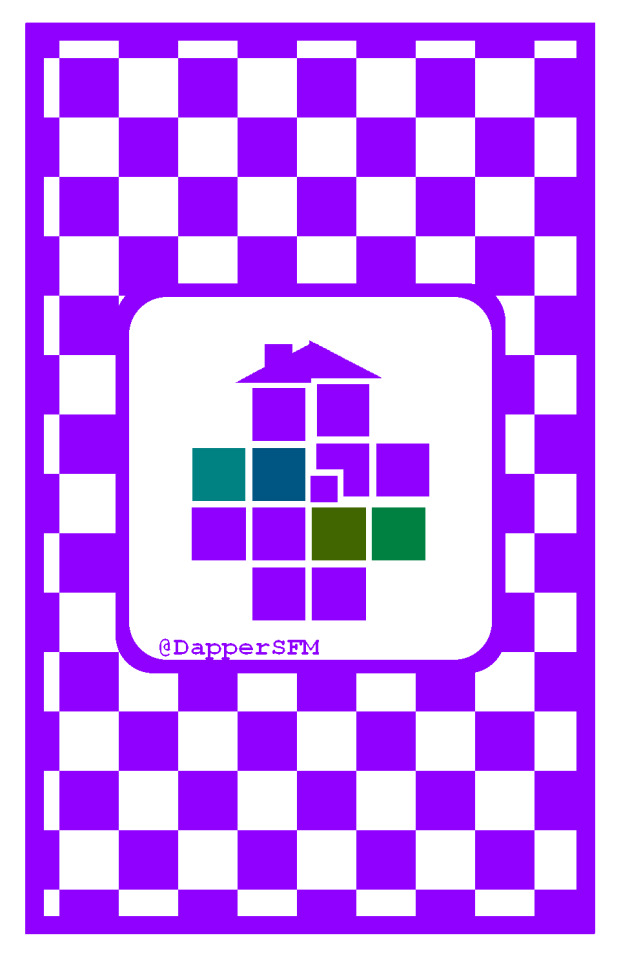
#queued post#homestuck#dapper.bmp#nepeta leijon#kanaya maryam#terezi pyrope#vriska serket#mah wife#trading cards#homestuck trading cards#homestuck beta trolls#beta trolls#rogue of heart#slyph of space#seer of mind#theif of light#homestuck god tier#homestuck god tier trading cards#god tier trading cards#god tier#update: one of my friends pointed out kanaya was missing her lips so here i updated it
14 notes
·
View notes
Note
heya any chancez i could get a tarrot card readingg on my game sesh timeline as roxy strider [dirkways]? ittd' be very cool of you guys [in a non gendering way] ᛒᛒ]]
Sure thing! I’ll do a beginning-middle-end spread focused on just your game session using my Homestuck Kickstarter deck!
———————————–
The Beginning
I got the reversed Page of Swords, which symbolizes aelf-expression, all talk and no action, haphazard action, and haste. You played SBURB as a lone wolf, taking things in your own time and way rather than working with the others. However, when it came time to work as a team, you tended to overpromise on what you could deliver, which resulted in setbacks. These setbacks could have been caused or resulted from rushing too much, feeling as if you needed to speedrun SBURB to complete it truly.
———————————–
The Middle
I got the reversed Ace of Cups, which symbolizes self-love, intuition, and repressed emotions. This is a HUGE sign that you realized you were a Heart player, and a Passive class as well! Passive classes are known for their intuition, and Heart corresponds to emotions and the “inner self”. The Rogue of Heart goes hand in hand with both you and the Ace of Cups! Not only does it align with your “swap” (Roxy’s Rogue and Dirk’s Heart), but this deck in particular features Nepeta on the card, the canonical Rogue of Heart! Classpect shenanigans aside, you were becoming more in tune with your emotions and sense of self, but you feared backlash from the others if you were open about them. You were taking the time to practice self-love, but worried if the love you gave yourself would extend to others’ opinions about you.
———————————–
The End
I got the reversed High Priestess card, which symbolizes secrets, disconnected from intuition, withdrawal, and silence. It seems as though something was pulling you away from your intuition at the end, and you needed to return to your inner self as soon as possible. What you did to achieve that was to hide away from everyone and the world around you, becoming a recluse. You honed in on your inner voice, but unfortunately, at the expense of your relationships.
———————————–
I hope this helps you, and let me know if it does!
#homestuck#homestuck kin#tarot#roxy strider kin#roxy strider dirk ways kin#kidswap kin#mod nepeta#when i got to the second card i was like#well rogue of heart seems right#but i don't want to assume solely based on the swap#and my deck was like THEY'RE THE ROGUE OF HEART FUCKASS#my deck isn't karkat but i feel like it's got that energy sometimes LMAO
4 notes
·
View notes
Text
Rogue of Heart
A Rogue of Heart values the personalities and identities of others so much that they give away their own in an attempt to let others flourish. They use direct courses of action to help others shape into what they deem to be what is personally best for the people in question. This means they often forget about themselves.
#rogue of heart#nepeta leijon#classpecting#classpect analysis#homestuck#rogue classpects#heart classpects#ao classpecting#blurb 144
14 notes
·
View notes
Text
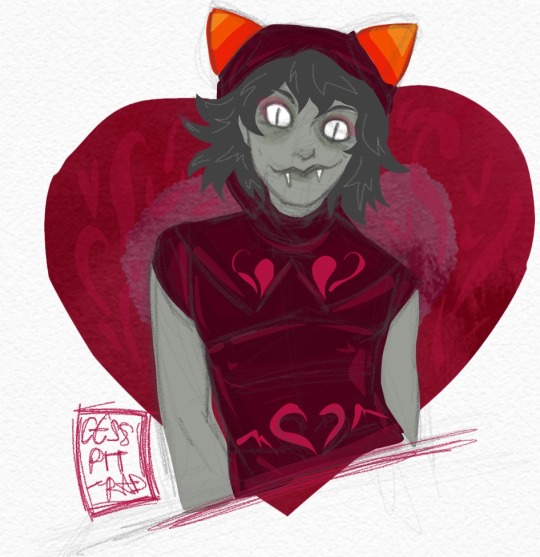
Sloppy phone sketch 5 - Rogue of Heart
18 notes
·
View notes
Text
i am worlds #1 nepeta enjoyer. nobody knows her like i do.
#dont even get me STARTED#shes the character of all time#man#ugh#UGH#i need to rp her again#her moirailegence with eridans descendant was EVERYTHING TO MEEEEEEE#in high school i rped nepeta <3< eridan AND I WAS RIGHT I WAS SO RIGHT#i did nepeta <3 vriska too#AGAIN. I WAS RIGHT. I WAS RIGHT.#her relationships with everyone is everything to me#i DO have a nepeta vantas...#rogue of blood...#much to think about#maybe karkat leijon would be more like what im after#knight of heart#nepeta is such a trans guy#when people draw nepeta fat and hairy it makes me crazy
5 notes
·
View notes
Text
Which color is most similar to Nepeta heart?
reference:

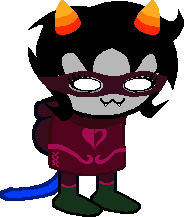
lighting outside:
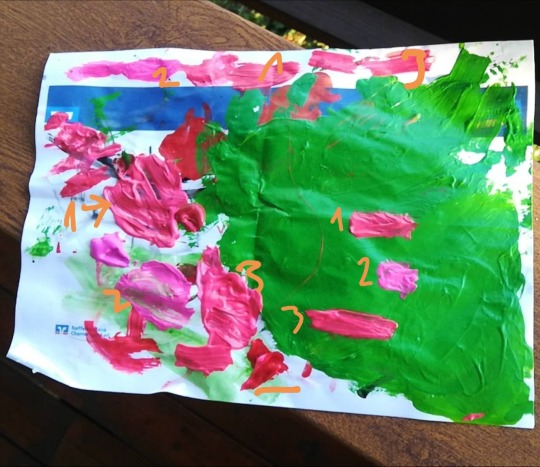
lighting outside:
(1 and 3 look sooo red here)
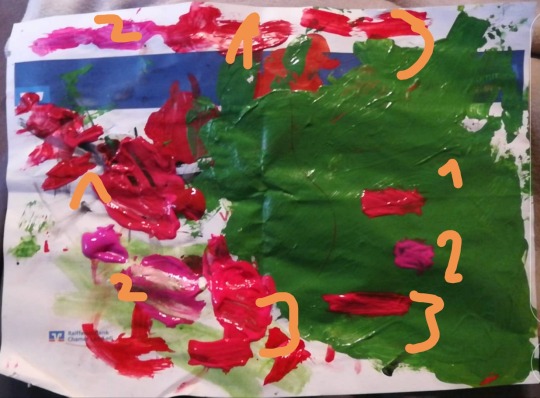
thanks in advance <33
6 notes
·
View notes
Text
Rogue of Heart: Por Eles, Tudo de Si
Você quis dizer: Nepeta Leijon? Olha só, parece que os Moirails vão sair em sequência – ele diz, fingindo que não sabia disso desde o início. Mas vamos ao que realmente importa, agora temos mais um exemplo de alguém que não atingiu seu potencial porque teve ele cortado. Mais por preguiça de continuar escrevendo a personagem do que qualquer outra coisa. Mas, assim como o post anterior foi sobre…
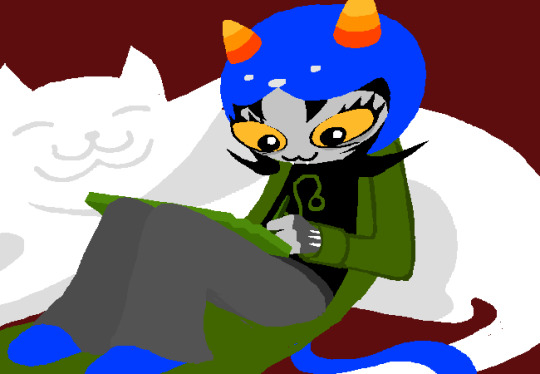
View On WordPress
#aspect#aspecto#canon classpect#class#classe#classpect#coração#guia de sburb#heart#homestuck#ladino#ladino do coração#nepeta#nepeta leijon#rogue#rogue of heart
6 notes
·
View notes
Note
Gotta say, aspecting Sasuke a Blood player is really clever. I think the impulse would be to call him a Rage player because his whole deal is angst fueled revenge, but if you look at where that desire comes from and what it means for his character dynamics and story arc, that desire and its consequences are firmly rooted in Blood.
Sasuke's whole arc's primary focus in about how his desire for revenge, yes. But that revenge fantasy is the manifestation of a sense of obligation to the dead of his clan to end the life of their murderer and his brother who he believes a traitor. And the anxiety from past perceived betrayal coupled with that fixation on obligation results in him being sabotaging new relationships with the characters around him, because it twists his view of relationships away from the typical mutualistic bonds between comrades to one of self-centered transactional tools to be exploited and discarded; when Sasuke believes characters have nothing left to offer him, he abandons them, betrays them in favor of pursuing his own agenda alone.
His core character arc then, is one rooted in a fundemental misunderstanding and harmful malapplication of Blood's core ethos as presented in shōnen storytelling.
I'm running through my head trying to decide on the best class to pair with Blood for Sasuke, and in canon, I'm torn between the three most overtly self-diasterous classes: the bard, the prince, and the mage.
The argument for Bard is that blood is something which destroys Sasuke, consumes him, leaves him lesser. He is through his interactions with Blood left hollowed out. This works narratively with how Orochimaru tries to groom him to become the snake's next vessel, but falls apart when Orochimaru fails to do that.
The arguement for Prince is that his whole quest begins as a search to destroy his last remaining blood relative, and he eventually succeeds though he destroyed the bonds he had with all his allies up to that point to do so. This argument falls apart when the story doesn't end with the death of Ittachi, and Sasuke has to grow beyond his now fulfilled revenge fantasy.
The argument for Mage is that his misunderstanding of his elements leads him towards using it in self-destructive ways. By continuously isolating himself as a form of self-flagellation with the aim of growing stronger. This particular one falls apart not in Sasuke's arc, but in my personal reading of the Mage class as a whole. I don't think the mage is best characterized as the active but self-destructive analogue to the seer class. The primary view we get of the mage class is Sollux as a mage of Doom, and what Sollux as a mage is doing is actively amplifying his aspect: He's increasing Doom. The same way Dirk's splinters are more stemming from how Heart is influenced by the Prince class, shatter it; Sollux's self-destruction stems more from how Doom is influenced by the Mage class, amplifying it. And Sasuke ain't amplifying Blood.
If we open ourselfs up to fanon, I do have a class in my expanded classpect system that's in my opinion perfect for him, or rather, I will have it after I bother with making the class write ups (only have the aspects done right now).
The Mime, which abandons its aspect, would perfectly describe Sasuke's characteristic interactions with Blood: he abandons his bonds with his squad in pursuit of permanently severing his bond with his literal brother, and he abandons any other allies he makes along the way, who he views tools to be used in pursuit of his goal and then discarded when no longer useful. Perfect match to my reading of the character.
Anyway, that's a lot of words to say good pick on Sasuke as a Blood player OP, it makes sense that he'd identify strongly with the story structure and themes of another blood player because because their storys, rooted in the same Aspect's themes mirror each other.
Is.. is sasuke wearing a kismisis shirt. Is sasuke a homestuck
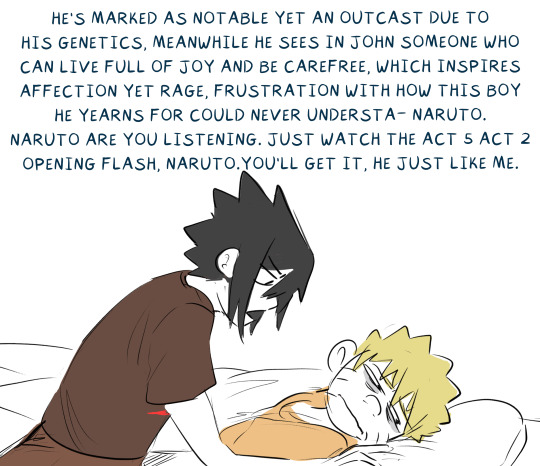
#Naruto meanwhile is much more easy to classpect#the boy's either a rogue or sylph of heart#depending on whether you read his ability to make allies as stealing their respect and affection or healing their soul-wounds#I lean more towards sylph personally#but he is quite nepeta-esque in some ways#other than just the furry motif I mean#so I could respect a rogue-ish interpretation#homestuck#classpect#naruto#sasuke
6K notes
·
View notes
Text

nepeta rogue of heart edit
601 notes
·
View notes
Text
Thieves & Rogues: Inundation and Redistribution
A day late, I'm aware; turning 18 will do that to a girl. I'm now older, and definitely not wiser.
The Thieves & Rogues are another contentious group; particularly the Thieves for various discourse-generating reasons - but the Rogues have their pitfalls and fall victim to mischaracterisation a lot more than you'd assume.
The Thief:Rogue dichotomy embodies inundation, redistribution and possession. It's the authority over who gets to hold their Aspect for themselves; whether it's them or somebody else, that's what being a Redistribution Class is about.
There's often some insecurity about their capacity to hold it in play as well - and they tend to use a lot of their opposite Aspect's forces; after all, what do you get when you take something but the absence of it, and therefore its opposite?
Canonical Thief players are Vriska Serket (Thief of Light) and Meenah Peixes (Thief of Life).
Canonical Rogue players are Roxy Lalonde (Rogue of Void), Nepeta Leijon (Rogue of Heart), and my arch-nemesis Rufioh Nitram (Rogue of Breath).
Point A - the narrative function of the Thief.
The Thief is the one with active distribution of their Aspect; and therefore the one liable to actively steal it. This, on paper, sounds pretty nasty - there's a reason why Thieves are lumped in with the nebulously 'bad' classes; but it's a neutral role with possible applications in either sense.
They often hold a deep-seated obsession with their Aspect; they think it's something that's out to get them and conflate an excess of it with an absence. Their perceived lack of it motivates them to hoard it, as much as possible.
Vriska Serket, the Thief of Light, is contentious for a damn good reason. Imbued with ungodly plot armour and fortune's favour, she seizes control of the narrative by force, all the while bemoaning her unlucky streak & employing the most unsubtle methods of manipulation she can think to use.
Meenah Peixes, the Thief of Life... does not understand the consequences of her actions; period. She thinks Life is out to get her, exacts every bit of free will she has out of spite and cultivates discourse and stagnation to try and encourage character development. (Oh, yeah, she also... kills people. Like, a lot.)
Their opposite Aspects are, therefore, pretty prevalent! By taking away their Aspect; they leave the inverse behind.
Vriska stealing Light leaves Void. Meenah stealing Life leaves Doom.
Often, it's almost as if they're using their inverse to cultivate their actual Aspect; Vriska uses offscreen events to justify onscreen developments - it's how she 'takes luck'. Meenah uses suffering and control in order to encourage growth - it's how she 'takes life'.
They care very little for their Aspect at the centre of it all, despite their perceived obsession; they don't seem to understand the value of it at all. That's the interesting part, I feel.
Point B, the practical function of the Thief.
Now, taking the Aspect is a very powerful ability in the right hands. We don't just see Vriska metaphorically rob fortune, she literally steals luck from her enemies mid-fight and utilises chance and possibility in order to get the upper hand.
Meenah takes 'taking life' about as seriously as you can get - not only does she really like killing people, but as the Condesce everything she did resulted in stagnation and decay in her wake as she robbed the worlds she ruled of the ability to develop; using control and hegemony to cultivate development and failing miserably.
The opposing Aspect, again, plays a prominent role! Vriska forgoes certainty and manipulates the absence of a definitive outcome to play around with luck. Meenah forgoes development and enacts control on the people beneath her to play around with change.
Point C, the narrative function of the Rogue.
I'm gonna use the Thief's concluding point as the jumpoff point for the Rogues; whereas the Thief devalues their Aspect, the Rogue puts too much stock in its importance. Their Aspect is too important to them; and so their relationship with it differs.
Passive classes tend to act without realising it, and the Rogues are no different - I'd argue their presence often leads to their Aspect being taken in a way they don't realise they're doing.
Roxy Lalonde, Rogue of Void, is desperate for attention, and yet obfuscates knowledge, is isolated from all society and would rather get drunk at the start of her arc than face the truth of her situation. I'd argue that she downplays her own importance as a person in the face of her friends' catastrophic communication failures. By being around, she takes the Void from her session and opens up ways to communicate whilst learning to give irrelevance to things.
Nepeta Leijon, Rogue of Heart, puts people into boxes. She makes them into little cariacatures on her walls, plays matchmaker in her stories; and yet she's also one of the most emotionally mature and genuine trolls in the story - she wears her Heart on her sleeve, and doesn't deny it. By being around, she takes the Heart from her friends by way of drawing out truer selves, as we see in her relationship with the insecure & disingenuous Equius.
Rufioh Nitram, Rogue of Breath, takes people's sense of purpose and direction and makes their agency depend on his presence in their life. He does Damara and Horuss dirty time and time again, and yet they can't cut him off because he's made himself too important. And yet there he is, spineless, giving away his own free will because he holds no security in his selfhood. He's trapping people in relationships without realising. I also want to drop an anvil on his head.
The common thread, despite the differing situations, is the indirect usage of the opposing Aspect to passively take away the true Aspect and the character development involving a realisation of their Aspect's value and the importance of keeping it for oneself. Roxy is the only Rogue whose development we see in full, unfortunately; but there's snippets with Nepeta and Rufioh Nitram changing isn't happening any time soon.
Point D, then. The practical function of the Rogue.
Once again, Roxy is our only point of reference by virtue of being the only God-Tiered Rogue; but luckily, she also gives us some really good demonstrations. Roxy literally takes the nonexistence away from something, bringing it into existence.
Inversely, she's capable of giving Void to herself, cloaking herself and by extension her whole session in a veil of invisibility. She's controlling the distribution of Void, letting it both be taken and given; after making her peace with the distribution of it.
So, the common thread is the central question of 'who gets to have my Aspect?'
A Thief would tell you 'me', and a Rogue would tell you 'anyone else'. That's what I feel separates them, and yet don't let that convince you that Thieves are bad and Rogues are good; look at Rufioh. A Thief may take for altruistic reasons, and a Rogue may give away for... not so altruistic reasons!
Get creative with it, that's what I say. How about a Thief of Doom who takes on everyone else's suffering because they're self-sacrificial to a fault? ...Okay, actually, that's my idea, don't take that one.
Anyhow, next week I'll be concluding the 'normal' classes with the Maids and Sylphs! Should be fun, I'll see you then - hopefully on time, too.
#homestuck#homestuck analysis#classpecting#thief class#rogue class#thief of light#thief of life#thief of void#thief of doom#thief of space#thief of time#thief of heart#thief of mind#thief of hope#thief of rage#thief of breath#thief of blood#rogue of void#rogue of heart#rogue of breath#rogue of light#rogue of mind#rogue of blood#rogue of space#rogue of time#rogue of life#rogue of doom#rogue of hope#rogue of rage
72 notes
·
View notes
Note
Would anything have changed if Erisol, Arquius and Fefeta had double godtiered like Davepeta?
If the three of them had somehow gotten Prototyped^2 by coming in contact with the alpha session's kernelprites and achived ultimate self like Davepeta did, they would've been able to switch form one claspect to another, and have memories of all timelines from their component's points of view.
Erisol wouldn't need any character development because that prototipation^2 would be basically a speedrun on self acceptance. He could've switch between Mage of Hope and Prince of Doom and would have helped Sollux to destabilize the condesce during the the "Finish it" battle.
Fefeta could've switch between Witch of Heart and Rogue of life and would also gain memories of the Fereris and Nepetas from all timelines, including beforian versions, making her a great lider as she remembers ruling beforus as alpha Feferi.
Arquius... He's a Dirk splinter, which would make him an alternate version of Ult!Dirk plus Ult!Equius, which might include memories from lord english, seeing as he's composed partially by Equius and AI!Dirk aka Hal. Idk if he can handle that, something's gonna go wrong there. He could switch from Prince of Void to Heir of Heart so he's not a Prince of Heart perse, won't lose his heart like Dirk did, but has the extensive memories of all Dirks, who are and did and all their reasoning, so go figure it's a 50/50 on him going megalomaniac. He'll still kiss Erisol at the end of that battle tho before he goes of to ruin things i guess.
#csau extra#fefeta peijon#eridan capora#arquius strihak#arquiusprite#fefetasprite#erisolsprite#sprites#i love arquius i don't want him to be ult!dirk 2 :(#but the cards are against him if he prototypes^2
251 notes
·
View notes
Text
I am basing a TON of what I'm doing with 33peta on this particular understanding of what a Rogue is and what they do. In canon, Nepeta is like, the MOST outspoken about how awful hemocastism is in the entire comic. She wants it to be taken down, but her naivety and optimism makes it so that she doesn't have a particularly solid idea of what would happen afterwards. Her moirallegiance with Equius has SO much to do with the way they both relate to the hemospectrum, and trying to help the other one through their struggles with it. In the Disgrub server, 33peta spent a couple weeks preparing for a fight with her timeline's Gamzee. In canon, she basically pounced at him on impulse with no plan, and was thoroughly beaten. She was able to pre-poison his soda, set up traps, use fraymotifs, and alchemize a legendary weapon for her fight. Plus, she had her quadrantmates in call with her the whole time. All of this combined allowed her to kill a character who is nigh unkillable in the comic. I LOVE the way Rogues are described in this, but I also really think that all classes are described masterfully and in a way that allows for a much deeper understanding of the characters in the comic. I HIGHLY recommend reading this whole thing through.
CLASSES - a comprehensive guide
The first thing that needs to be said is that there is no such thing as a "bad" class. All of them have the potential to be a great detriment OR great boon to the rest of the team, depending on how far along the journey of self-actualization a party member is. Some may have steeper challenges, but this corresponds with greater rewards.
The second thing that needs to be said is that all players are part of a team, and all personal journeys and playstyles are interlinked. No class is truly "solo." Even the smallest viable session is still two people, and even the most suitable classes for solo play are stronger when they're in a party.
The last thing that needs to be said is that the game wants you to succeed. The game, inherently, wants every player to reach godhood, wants every player to self-actualize, wants every player to win. It respects free will and free choice, so it will allow for failures (and, indeed, doomed timelines are vital to the alpha one existing), but Skaia is ultimately optimistic, and tries at every turn to ensure that a golden ending is possible.
Because, after all, SBURB/SGRUB - and Homestuck itself - are about children growing up, maturing, and learning compassion for each other. About fixing their flaws and rejecting the negative aspects of the society they came from. It's about how it is our duty, our responsibility, to become kind, mature people who care about one another, because we will one day be responsible for creating a new society.
And so, without further ado:
ACTIVE (-) Classes and PASSIVE (+) Classes are described with the dichotomy of "powers working for the self" vs. "powers working for others," but I believe this to be an oversimplification of what the active and passive split is. Both active AND passive classes benefit from being in a party; however, an active class will gain fewer party benefits in exchange for being more suited for solo play, while a passive class will be less suited for solo play, but confer much greater benefits to party play.
This is reflected in their personal quests: while active classes and passive classes will both require intervention, empathy, and guidance from their teammates, the struggle of an active class is usually one of grappling with internal flaws, and the struggle of a passive class is one of grappling with interpersonal or societal relations. In other words, the personal quest of an active player will usually involve getting therapized, while the personal quest of a passive player will usually involve addressing a systemic societal issue. Often, both will be required, but whether a class is active or passive will indicate an area of focus.
KNIGHT - / MAID +
PARTY MANAGEMENT
one who wields [aspect] or leads with [aspect] / one who distributes [aspect] or manages with [aspect]
KNIGHTS (-) are a very flexible and versatile class; "wielding" their aspect does not necessarily mean they are skilled at DPS. It actually indicates the way a knight interacts with their aspect, a very straightforward relationship of tradesperson and tool, or soldier and weapon. Similarly, while a knight does not always take up the "leader" position in the party, they will be the "spearhead," a point behind which the other players rally, a beating heart keeping the party together.
This straightforward relationship between a knight and their aspect leads to knights finding little difficulty mastering their aspect once they've begun. Many knights are, in fact, instinctively drawn toward utilizing their aspect, in the same way that they are naturally drawn toward roles of importance or heroism.
Knights often struggle with their perceived place in society, as well as with their innate sense of self and self-worth, seeing themselves as outcasts, resenting the responsibility placed on their shoulders, and fearing vulnerability. Unaddressed, these issues will lead to knights who actively become a detriment to party success. For example, they can dismiss valid concerns, shirk their duties, and in the worst case scenario, actively lead the party down the wrong path, invoking their natural ability to lead for ill.
Therefore, a knight's journey is one of accepting themselves and accepting their duty to better the world. It is about coming to terms with their own insecurities and learning to rely on others. It is about learning to take responsibility, and accepting the banner of a just and glorious cause.
A fully realized knight will be the center of every charge, the guiding star behind which the other players rally. They can provide clarity and guidance to those still on their journeys, and peace and comfort to those who are struggling or in pain. Where the knight goes, the party will follow, as a unified and united front.
MAIDS (+), meanwhile, tend to be on the backlines. If the knight is the forward march, then the maid is the supply line, an incredibly vital role whose absence is disastrous, even if its presence is nearly invisible. Maids have a nearly infinite well of their aspect to distribute, and are uniquely talented at managerial duties - keeping players on task, patching up the holes in a plan, sourcing and supplying resources, so on and so forth.
This is not to say that maids are relegated to support roles - a maid is usually capable of holding their own in combat just fine, especially if they've been endowed with a more combat-suited aspect. Both knights and maids are extremely versatile. That being said, maids truly shine when they're able to take on these backline roles, and many maids are more noticeable by the devastating effects of their absence rather than the invisible touch of their presence.
However, they are the class that most often starts in subservient conditions - low status, strict duties enforced upon them, so on - and their personal journey is a constant struggle against the control of others. Maids whose parties fail to grapple with and undo these shackling forces will find their maids succumbing to the influence or control of malicious entities; in the worst-case scenario, a maid can become an actively hostile enemy or saboteur, invisibly pulling the party's strings and setting them up for failure.
Therefore, a maid's journey is about rejecting societal oppression and throwing off the chains that bind them. A successful maid rises to become the head of the household - nothing occurs within the game that does not first pass the maid's inspection, and their touch ensures that there is a place for everything, and everything is in its place.
A free maid, who belongs to themselves, incomparably increases a party's efficiency. Every communication line is clear, every distribution route is clean, every mystery is solvable, and every plan is airtight. A maid guarantees that nothing can ever go too wrong.
PAGE - / HEIR +
TEAM BONDING
one who must earn [aspect] or inherits the mantle of [aspect] / one who is beloved by [aspect] or awakens to [aspect]
PAGES (-) start the game with the fewest benefits from their aspects, but the greatest potential for growth. Theirs is a constant battle with the self; they are often cowardly and naive. They possess sensitive souls, and while it is incredibly easy to hurt a page, it's much more difficult to build them up. Because of the difficulty of raising this class, it's practically defined by its journey - a constant struggle against the self - rather than its destination, and the powers the class confers.
Pages, like heirs, are classes of inheritance. A page is promoted by trials and tribulations and comes to inherit a greater power than they begin with; in the same way, the class will one day come to embody its aspect, although the road will always be turbulent and long. Moreover, it is a journey without end; pages, being as sensitive as they are, are the most prone to backwards progress, even after reaching their peak.
They prone to staying weak throughout the entire game, never self-actualizing past being the party joke. They attract the obsession and ridicule of stronger-willed players, and their mistreatment can become extremely divisive. A page can easily become a party's albatross, the epicenter of massive interpersonal conflicts, which can tank an entire session.
Therefore, a page's journey is one of the most difficult of all - that of teaching others how to care about other people. Pages rely on great patience, kindness, and understanding. Their sensitive souls must be carefully nurtured and propagated with love and attention. In the same way that a page can tear a team apart, they can bring a team together, all in the name of compassion and empathy. A fully-realized page is the symbol of a party that has linked hands with one another.
Self-actualized pages, as a result of the difficulty inherent to the class, are incredibly powerful and versatile when fully realized. Inheriting the mantle of their aspect, they become pure embodiments of their aspect, capable of achieving impossible feats of raw, unfiltered power, and inspiring all those who gaze upon them.
HEIRS (+) begin the game very strong, but have a difficult time becoming stronger. This is because their usage of their aspect is very instinctual to them, even at times being entirely beyond their control, hence, "beloved by" in the class description. However, because of how naturally their aspect comes to them, it makes taking further command of their powers difficult.
An heir "awakens to" their aspect because their natural, intuitive control often renders them too comfortable to grasp the greater implications of their class. As an inheritance class, heirs can come to embody their aspect, transforming entirely into it. Their challenge lies in breaking out of their comfortable shell and learning how to utilize their powers in more active, intentional ways.
This is reflected in their personal quests. They are often set to inherit great privilege or wealth prior to entering the game, and are thus naive to the realities of the suffering and pain of others. Without a supportive party willing to challenge their views, heirs can perpetuate that pain by submitting to their place in the world, becoming a divisive force within the party, or, in the worst case, losing themselves to their inheritance, and submitting so wholly to their aspect that they become lost to the rest of the team.
Thus, an heir's journey is to question the stratification of the society they belong to, so that they can recognize and address its flaws. They must learn to interrogate their inheritance, separate it from themselves, and reconcile with it. Theirs is an arc of examination and understanding, descending from their position of privilege and peace to learn about the suffering of others, and deciding that they wish to do something about it.
With full command over their aspect, and a clear vision for how it ought to be distributed, the party gains a new and powerful ally - the aspect itself, which will come to embrace the entire party as family. A fully-realized heir connects the privileged and underprivileged, spreading their inheritance to all.
MAGE - / SEER +
GUIDANCE
one who invokes [aspect] or is drawn to [aspect] / one who comprehends [aspect] or is guided by [aspect]
MAGES (-) are a class of prophets, although saying they "see the future" is misleading. Rather, mages "invoke" the future, collapsing causality to align to their desires. Most mages remain unaware that they are doing so until well into their journey. While all players weigh on the scale of causality, affecting both past and future events, and which sequence of events is the "alpha" sequence, mages have the most direct effect.
Because of this ability to invoke future events, mages possess powerful buffing/debuffing abilities. Furthermore, as one of the two knowledge classes, a mage usually has a very deep understanding of their aspect, and an intuitive knowledge of how the flow of time and causality function. They are "drawn to" their aspects in this way, instinctively searching out points where their influence can affect the flow of events.
However, with great power comes great cost; the mage class is usually assigned to those who are stricken by tragedies and prone to negativity and self-loathing. Mages often begin the game as a detriment to the party, "prophesying" future events that leave the party - including themselves - at a disadvantage. In the worst case scenario, a mage can invoke certain doom for their party or themselves.
Therefore, it is vital that a mage address their tragedies and be given a chance to heal and grow. The ones most struck by tragedy, theirs is a journey of reclaiming lost joy and rediscovering lost hope. However, the transformation is powerful once completed - as the one who suffers tragedy and loss most intimately, a mage can also come to be one of the most empathetic and compassionate members of the team.
If a mage is uplifted, and capable of believing in a kinder and gentler world, then their ability to invoke the future - and the aspects of their aspect that they are drawn to - become kinder, as well. Pain and suffering still have their place, but the ending will be a happy one. With a fully empowered mage, the future will always be better than what came before.
SEERS (+) see multiple branching paths. A mage determines where a road will be built, but a seer tells you where a road CAN be built. They are also often gifted with knowledge of the game and its mechanics, and are especially uniquely gifted with understanding of their own abilities. In this way, they "comprehend" their aspect.
Seers themselves are not particularly gifted in combat through their classpect alone; however, in exchange, they often play a vital role in steering the party. They are the game's built-in guides, with an intuitive knowledge of the game's victory conditions, as well as an instinctive desire to lead others along their paths. Seers are, therefore, one of the most important classes in the game, when one is present.
However, the ability to see is a burden as well as a gift. Seers find themselves paralyzed by choice, and often doubt their own abilities to choose "correctly." They are prone to becoming mired in what-ifs, and struggle with political or ethical debates with no clear answers. In the worst-case scenario, a seer may feel so cursed by their sight that they self-destruct, and deliberately choose poor or incomprehensible answers, in an attempt to free themselves of their sight.
Thus, a seer's quest is, ironically, to see the world beyond the purview of their aspect. They must come to have a more comprehensive understanding of the world they live in, and what purpose they are trying to achieve, so that they can feel confident in the choices they make. A seer is often blind - their journey, therefore, is that of regaining their vision, by connecting with the world outside their inner sight.
A seer with a clear vision for the future will always know exactly which path to choose. A party with such a seer in it will never be stuck and never be lost. If there exists a path to self-actualization, the seer will know it. And if there exists a path to a breathless and perfect victory, a fully-realized seer will light the way.
THIEF - / ROGUE +
UTILITY
one who steals [aspect] from others or steals with [aspect] / one who steals [aspect] for others or steals from [aspect]
THIEVES (-) are a very difficult class to play. They start out with almost no passive abilities regarding their aspect, and their ability to actively use their aspect is contingent on their ability to first "steal" it from someone else. Thus, they are always playing a game of resource management, and there is always a chance for them to be left helpless after a heist gone wrong.
However, their gimmicky nature allows them to overtake other classes even in that class's specialty, if they can set up the exact right circumstances and manage their resources well. This makes them incredibly versatile, especially when a thief is working together with a party, and thus able to count their party among their potential resources. It takes great cunning to play the thief class well.
However, this also makes the thief a potentially dangerous element to the rest of the party. Thieves are often egotistical and self-serving, willing to see enemies and allies alike as resources and tools. Unaddressed, their reckless, selfish natures will earn their teammates' distrust and enmity. In the worst case scenario, a thief running rampant can severely harm the party, or earn so much ire that the party turns against them.
Thus, their journey is that of realizing that their selfishness and ego are flaws - the classic parable of "money doesn't bring happiness." Beneath their uncaring surface lurks genuine emotional distress; a thief must come to realize that their greed and selfishness is an active detriment not only to the people around them, but their own selves. Only then can they heal from their injured souls.
A thief that has undertaken this journey is one who has realized that they are stronger when they are working with others. Their versatility, creativity, and cunning are incredible assets once harnessed toward the will of the party. No situation will ever be inescapable, no safe uncrackable, and no problem unsolvable - not if the thief has anything to say about it.
ROGUES (+) are similarly difficult to play. Unlike the thieves, rogues do see passive benefits from their aspects. However, their active abilities are much less straightforward, and rogues often struggle with understanding them. A rogue's role is to redistribute wealth - thus, "stealing for the sake of others."
A rogue, being able to steal directly from their aspect, truly shines when given enough time to prepare. If a thief must fly by the seat of their pants, then a rogue is a heist planner - they have an infinite box of tools to pull from, if only they know what tools they'll need for the job. This makes them incomparably versatile, even if not necessarily in the heat of combat.
Rogues take on the mantle of challenging the status quo. They usually begin the game already in opposition to their society, seeking out better alternatives and considering unorthodox options. However, not every party is ready for a rogue's radical ideology, and not every rogue has considered the full consequences of their belief in change; in the worst case scenario, the rogue can become outcasted and disregarded, or cause an upheaval that proves disastrous, rioting for the sake of rioting.
It often requires the help of others for a rogue to understand how to use their powers. In the same way, it requires the party's honest communication and exchange of ideas to help a rogue grasp exactly what form their rebellion ought to take. A rogue knows instinctively that something must change; their journey is learning how they ought to go about it.
Once they do, a rogue - given enough time to prepare and plan - is the ultimate utility player, having the right tool for every possible situation. Their abilities are only magnified in a party setting, as their teammates become variables that unlock new possibilities. A party with a fully-prepped rogue always has a perfect plan, a way to solve any problem that they might face.
WITCH - / SYLPH +
AREA CONTROL
one who manipulates [aspect] or achieves dominion through [aspect] / one who nurtures [aspect] or creates a land of [aspect]
WITCHES (-) carry with them the winds of change. A witch manipulates, changing properties of their aspect and their aspect's effect on others, creating a "territory" over which they rule. They see few passive benefits of their aspects, in exchange for their active abilities being so all-encompassing and overwhelming.
Once their territory has been established, witches make the rules. Their changes can be permanent, temporary, massive, and miniscule. However, a witch "achieves dominion" with their aspect - this means that they must first struggle to create this domain, and it's difficult for their abilities to manifest until they do, often leaving younger witches weak and vulnerable.
Witches have strong feelings for how things should and should not be, but not necessarily grounded ideas for how to implement them, often due to some "outsider" status in society. Unfocused witches become dangerous for the party, as they are easily manipulated; in the worst-case scenario, they can fall in with malicious forces, who can sway a witch's turbulent heart and utilize them as a force for negative change, rather than good.
Thus, a witch's journey is that of interrogating right and wrong. A witch must struggle with morality and ethics, and come to clarify their own beliefs; only then can they know what sort of domain they wish to establish, and what sort of rules they wish to enforce. Once they know their own hearts, they can shake off the insidious whispers of malicious external influence.
As if a reward for their struggles for autonomy and independence, the witch is the one whose will is most imposed on the world that comes after them. Just as an evil witch putrefies the world around them, a fully-realized witch who has decided to use their influence for good can create a near-utopia.
SYLPHS (+) call to mind the images of fey folk who sprout plants where they walk. That is how a sylph "creates a land" of their aspect - merely by existing, the world around them becomes suffused by it. A sylph's mere presence nurtures, grows, and heals their aspect; unlike witches, who manipulate what is already there, sylphs can create something from nothing.
The establishment of their domain comes naturally to them. Those caught within it are on the receiving end of their aspect, whether they want to be or not. In exchange for such powerful passive abilities, a sylph's active abilities are weaker, and usually unsuited for solo combat, generally being of healing, buffing, or debuffing nature.
A sylph is prone to selfishness - to luxuriating within their own land, their own aspect, their own mind. They often have difficulty connecting with others and understanding why their own personal world may not be to the liking of the world outside of themselves. Often, they are aloof. An unrealized sylph can cause great harm to the world around them, their domain choking out and smothering their party; in the worst case, they can mire their party within it, leaving their party unable to proceed.
Thus, it often requires the outside world to breach their safe haven in order for a sylph to grow. They must be made uncomfortable, and then made to accept that uncomfortable things are also important - maybe even more important than comfort, at times. Growth often requires pruning; a sylph's journey is to come to understand that good intentions may lead to harm, and, vice versa, that harm can often lead to true growth.
Sylphs can provide the greatest compassion and emotional comfort within a party, encouraging - if not enabling - their teammates' growth in their personal journeys. Once a sylph understands when it is appropriate to encourage, and when it is appropriate to pull back, there is no refuge safer for the party than the sylph's domain.
PRINCE - / BARD +
OBSTACLE REMOVAL
one who destroys [aspect] or destroys with [aspect] / one who allows the destruction of [aspect] or allows destruction through [aspect]
PRINCES (-) possess the ability to annihilate, a destructive class not limited to physical or tangible objects. Princes also enjoy auxiliary benefits as befits their royal titles - many princes start the game with great talents, great status and wealth, or both. They are also endowed with royal presence; their very existence provokes strong emotions from those around them, for good or for ill.
One of the more straightforward classes in the game, a prince's ability to destroy most commonly manifests as DPS. However, their abilities encompass a greater scope than mere damage - the prince's ability to annihilate figurative or metaphysical concepts makes them capable of directly removing any obstacles that stand in their way. As if hungry to consume their aspect, they are naturally drawn towards where it congregates.
However, with great power comes great responsibility: princes are often the most psychologically maligned within the party, and their destructive talents can very easily become self-destructive instead. Usually the result of societal pressure, trauma, and suffering, a prince is prone to embodying the lack of their aspect, rather than its presence. In the worst-case scenario, a prince spreads this misfortune to the rest of their party, destroying the presence of their aspect from their session altogether, often taking themselves along with it.
A prince must be shown compassion. Though they are often viscerally unpleasant to engage with, turning a blind eye to foolishness, loneliness, and suffering - which a prince embodies - is one of the worst things that a party can do. Though the effort at times seems undeserved, to heal a prince requires a staunch belief that there is good to be gained if we are kind to each other. This kindness will be returned; once you are counted among a prince's "people," they will do anything to keep harm from befalling you.
A prince, once shown this grace, is incomparably powerful. To destroy their aspect or with their aspect is the ability to destroy nearly anything, including concepts such as despair, death, and doom. As if proclaiming a royal decree, a fully-realized prince can banish misfortune and ill tidings altogether, leaving nothing standing in the party's way.
BARDS (+) are a wildcard of a class, often responsible for a party's improbable victory, abject defeat, or both. Their abilities are not very well-understood, even by the bard themselves, and they often utilize both passive and active abilities intuitively, unaware that they are doing so. The morale of the party is deeply tied to the bard's own, and it's unclear which side is cause and which is effect.
The ability to allow the destruction of their aspect, or invite it through their aspect, is actually something of a debuff rather than DPS - the bard's ability is to break unbreakable shields, tear down unclimbable walls, and nullify unstoppable forces. Rather than dealing damage themselves, they allow for damage to be dealt that would otherwise have no effect - in other words, by nature, they make the impossible possible. This is the true source of their ability to evoke "miraculous" situations.
Bards are inextricably tied to society - after all, their tales only hold as much value as their relevance to the audience. This means those with the bard class are invariably molded by the worst aspects of the society they come from. They serve as living embodiments of the most unpleasant aspects of society, and living reminders that leaving these elements to fester only means they will multiply in severity. If these beliefs are allowed to go unexamined, bards will always steer a party towards ruin.
Therefore, a party must engage with the bard earnestly, compassionately, and openly, and help them see the errors of the past. A bard must be led, with gentle guidance and genuine openness, to discard their harmful beliefs, and sing a new, more beautiful tune.
A bard that has been brought back into the fold is a worker of miracles. When every other possible option has been exhausted - the knight and maid in disarray, the page and heir unable to keep the party together, the mage and seer blinded, the thief and rogue out of action, the witch and sylph with their territory lost, the prince no longer able to function - this is where a bard will step in, transmuting abject defeat into a perfect and breathless victory.
570 notes
·
View notes